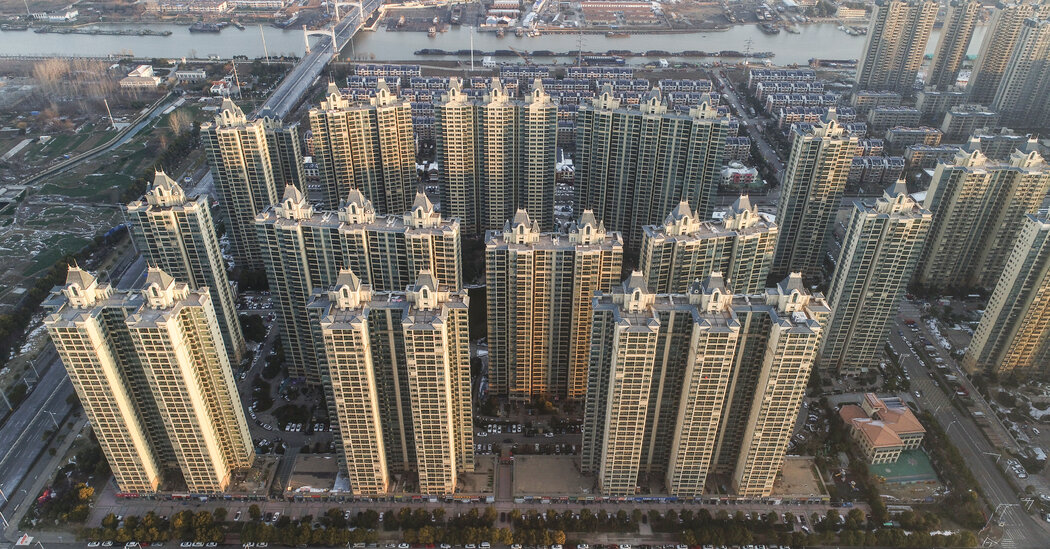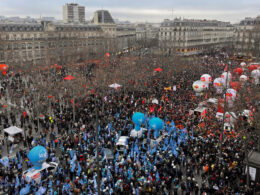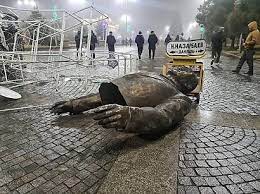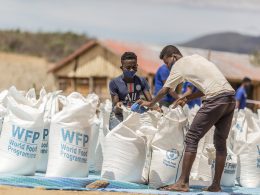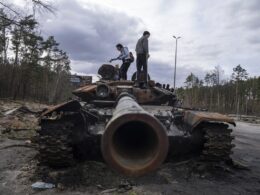Evergrande, the Chinese property company, is missing one payment deadline after another. If it collapses the consequences could be huge for China’s economy, its authoritarian regime and for global capitalism. ISA talks to Vincent Kolo of chinaworker.info about what could happen.
ISA: The name Evergrande has suddenly entered the news. What is Evergrande? How has it become so big?
VK: Evergrande is the second largest property developer in China. It’s a huge company in its death agony heading towards bankruptcy. Evergrande itself has built about 12 million homes, equivalent to half the total housing stock of the UK.
Part of the unfolding crisis is that it currently has 1.6 million unfinished housing units. A lot of property developers in China use a business model based on pre-selling. People buy their new home before the first spadeful of earth has even been dug. Now they are panicking as they have already paid, but if the company collapses, they will not get their new homes.
Evergrande has US$300 billion worth of debt, equivalent, for example, to the national debt of Ireland. At the end of September it began to default on its dollar denominated debts on the international bond market. But it has effectively not been paying its debts within China since March of this year. It has been paying its creditors, its suppliers, the building companies it has contracts with, in IOUs in total worth another $100 billion. Maybe many of them will never be paid.
The fear is is that the company is heading towards collapse. If this happens and there is no bail-out from the Chinese government this could trigger a meltdown in China’s property sector.
This could then spread to the banks, which are highly exposed to the property market. And then you have a financial crisis in China with all the economic and political ramifications of what that would mean.
ISA: Some compare Evergrande to Lehman Brothers — is this a good comparison?
VK: I think we can say yes and no.
Clearly Evergrande is not an investment bank like Lehman Brothers was. The Chinese financial system is not the same as that in the US or the European Union. It is dominated by the banks, and the banks, in most cases, are state-owned. The banking system is protected by exchange controls, the currency is not freely exchangeable, it is protected by capital controls which means they have a greater resilience to financial turbulence than the Western capitalists.
Does that mean the system is bullet proof, that there couldn’t be a financial crisis in China? The answer to that question is ‘no’, but a crisis is less likely to play out in the same way as it would in a Western capitalist economy.
When pro-capitalist commentators say “this is not a new Lehman Brothers”, in a sense of course they are right. But firstly, the risk of a banking crisis in China does exist, which is why Xi’s regime has imposed unprecedentedly tight capital controls both internally and towards the outside world. The banning of cryptocurrencies and last year’s crackdown on Ant Group [the fintech company owned by Jack Ma’s Alibaba] are examples of this. Even transactions between provinces are more difficult now.
Secondly, Lehman Brothers did not cause the Great Recession of 2008–09. But its collapse was a turning point, which dramatically accelerated the course of events. The crisis, whose roots were to be found in the very nature of capitalism, was already unfolding. If the Bush government had stepped in to rescue Lehman Brothers, the crisis would not have been prevented, it would just have taken a different form.
Coming back to Evergrande, it is a symptom of something much bigger.
ISA: Until 2008 it seemed that the property bubbles in the US and China inflated in parallel — but after 2008 the US bubble burst, while China’s continued to grow — what is the significance of this?
VK: 2008 was the turning point. Since then, none of the fundamental problems that caused the global crisis have been resolved. Debt has exploded on a world scale, with two historically unprecedented debt bubbles developing in the two poles of the Cold War.
In the US cheap credit and zero interest rates has seen the market capitalisation of the stock markets grow from the already bloated 140% of GDP before 2008 to 200% today.
But the fastest explosion of all the major economies has been in China, where the stock market is a secondary factor. Here the property market has been decisive. The market value now of all property in China’s cities is equivalent to 5 times its GDP. As a comparison, the market value of all real estate in the US in 2020 was about twice GDP. In China, the proportion is completely off the charts.
China, with a population about four times as large as the US builds annually ten times as many houses. Although this sounds good, many ordinary people cannot afford to buy them. Four of the five most expensive cities in the world for housing are in China. The whole housing market has been privatised since 1998, there is very little social housing. The rate of home ownership in the property market is 93%, much higher than in the US and Europe. But while very many cannot afford to buy new homes, the rich, government officials, and the most affluent layers of the middle class speculate in property. This leads to a huge problem of empty housing. In 2017, 20% of urban housing units were vacant. This represents an incredibly wasteful and unproductive use of capital, and the regime feels it has to intervene to stop this development.
The other factor in China is that the population is segregated via the “hukou” (housing registration) system. This divides the population into those who have the right to live in cities and those who are registered to live in the rural areas. Even though China is now largely urbanised, the majority of the population are still documented as rural. The cities too are placed in tiers. The most affluent cities — Shanghai and Beijing are in “Tier 1”. Those with a “rural” hukou are never allowed permanent residency in those cities.
Evergrande is more focussed on the poorer cities, those that in China are called the “Tier 3” and “Tier 4” cities, that are not usually visited by journalists of the Financial Times or Washington Post. These are where more ordinary working-class people live, and where the property crisis is most sharply felt. In part this is because capital has been ploughed into property development when most cities in China are no longer growing. This is connected to the population crisis, a massive problem for the Chinese dictatorship as the population is now shrinking. One figure that puts the whole Evergrande crisis into context is that three quarters of China’s cities are actually shrinking. So why build more and more huge housing projects?
ISA: So how do you see the crisis in the property market unfolding?
VK: The property bubble in China has reached its limits. It is bursting. How the process will unfold is not entirely clear, there could be different trajectories. But what we can say for sure is that Evergrande marks a turning point.
The property market has been crucial to the growth of the economy, it accounts for 29% of GDP in China. Now it is likely that the whole sector will be thrown into crisis. Evergrande is the biggest, the most sensational company in crisis, but there are other companies in the property sector that are defaulting on their debts, that are over-extended and probably going to collapse in the next period. The crisis is much bigger than just Evergrande. What this means is that the property market can no longer be the main motor for growth of the Chinese economy.
The Cold War between US and Chinese imperialism is intensifying the pressure on the Xi Jinping regime to ‘modernise’ the economy. But the international environment is now completely different as deglobalisation is taking effect. China is being checked and blocked, particularly by US capitalism, in more and more fields. So the Chinese regime has decided to bite the bullet, by cracking down on the excess leverage in the property sector as it represents a huge drain on resources.
Xi Jinping has taken a “tough love” approach to wean the economy away from its wasteful, speculative, reliance on over-investment and over-indebtedness and last year imposed the so-called three red lines on the property sector. Only companies which met these criteria, the ratio of liabilities to assets, net debt to equity, and cash to short-term borrowings, would be allowed to access the credit market. Evergrande violated all three of the red lines so it has been starved of capital from normal sources and instead switched to an “IOU economy”. More and more property developers are doing the same now as Evergrande — selling the houses before they are even built and using the money to pay off their debts.
The question is whether, as this destructive and painful process escalates, the government maintains its nerve, or retreats from its hard-line approach, fearful that otherwise the property bubble will run out of control and bring down the whole economy.
ISA: Finance experts are concerned about the effects of the collapse of Evergrande on bankers, investors and the like. But what about ordinary people? Will the collapse affect people looking for a home? What about those who work directly and indirectly for Evergrande?
VK: The majority of workers in China, apart maybe from a few in the, I suppose you could call it, the labour aristocracy have been shut out from this process, not buying these houses. So the effect it will have on the working class will be contradictory. If the property market collapses, and prices start to tumble, that could be popular among a layer of the population.
But for those who have bought property, which includes some urban white-collar workers, who have invested not just their own life savings but those of parents and relatives to buy somewhere to live, the collapse of property prices would be a catastrophe. They will face negative equity as happened in the US, Ireland, Spain and elsewhere after 2008. This is a red flag for the Chinese regime because if that starts happening across the country, you have the seeds of massive social discontent.
As for the workers of Evergrande — they are mainly the sales staff, managers, planners and accountants but not builders. The company’s workforce is about 160,000. They are very worried they will lose their jobs. The actual construction work is contracted out to companies that use mainly migrant workers on temporary contracts, working for low wages under very brutal conditions. When the job is finished, they are unemployed, then go elsewhere. If Evergrande goes down, three to four million jobs are threatened in construction and in the company’s supply chains. And with another ten or so smaller “Evergrandes” under threat, there could be serious effects on employment and on the wider economy.
ISA: There are reports that there have already been protests in China over this. Are they widespread?
VK: There have been protests now for several months, with a very diverse group of people demanding their money back. You can find both construction workers, sometimes construction bosses who have not been paid, so don’t pay their workers either. More than 80,000 Evergrande employees have “lent” the company money — around $15.5 billion according to one Evergrande manager — as managers have conned the workforce to buy so-called wealth management products, promising very attractive rates of interest to help the company get out of its financial squeeze. These people are not speculators, about whom you could say “it serves them right”, but often desperate people wanting to save their jobs, or earn a bit of interest for later life. There was one case of a woman suffering with cancer trying to raise money for treatment.
In several cities, people have been gathering outside company offices in a very angry mood demanding to be paid back. Most are employees of Evergrande. At this stage the anger is not directed against Xi Jinping, or against the CCP (so-called Communist Party), but against Evergrande. But this can develop into a more widespread anger if the government does not step in to organise some kind of bailout.
ISA: So how do you think Xi Jinping will handle this crisis?
VK: Publicly the government is saying nothing. It’s incredible. The global media is full of Evergrande, but you won’t read about it in China itself. However, the government is trying to use this crisis to pressure the other property companies to reduce their debt load. But it’s like a game of chicken — at what point will they give up on this tough approach if there is the danger of a meltdown in the whole property sector.
I think they will use a mix of measures. The approach of the CCP will be to officially deny they are rescuing Evergrande, but at local and regional level there will be different types of interventions and bailouts of certain entities to prevent this from going too far and limit the social fallout. First of all, for those who have bought the 1.6 million unfinished properties who risk not getting them, different state-owned enterprises and local governments will step in to complete construction, or takeover key assets like Guangzhou’s football stadium [owned by Evergrande like the team, Guangzhou FC], so this does not become a source of social discontent. Some domestic holders of wealth management products may be partially compensated. But international speculators I think will be left hanging. They won’t get anything back.
Evergrande itself will not be saved in my opinion. The plan then is to use that to teach the others a lesson, to establish discipline and control over the property sector. But the question is can they succeed? It is a very, very complicated and dangerous endeavour. By its very nature you can’t control a bubble. So, there are a lot of risks for the Chinese regime on how this can play out.
ISA: Evergrande has been criticised as following the “go global model” of Chinese capitalism — meteoric growth fuelled by debt. Is this model now failing?
VK: The “go global model” refers more to national champions such as Huawei, which was pushed to succeed on the global market, at least until it was blocked by first Trump and then Biden. Now Huawei is a company in distress.
Evergrande has not been particularly active on international markets, but it is very much a debt fuelled model. For many years China has been heading into a Japanese scenario. A debt filled property bubble there crashed in 1989. At that time the property around the imperial palace in Tokyo was worth more than the whole state of California — at least that was what was often quoted. That bubble burst and Japanese capitalism never really recovered. It suffered more than two decades of stagnation and the economy last year was the same size as it was in 1995. This could now be the future perspective for the Chinese economy.
Of course, it won’t be exactly the same, but it will be far more alarming if it happens in China, because Japan had a much firmer social welfare cushion than China.
Because of ‘hukou’, rural people are excluded from the unemployment benefit system, while only a section of the city population has some level of support. The vast majority of the population are completely uninsured. So, the kind of crisis that happened in Japan, or in Western capitalism in 2008, is not going to happen, instead any crisis in the Chinese context with living standards so low, and lacking any welfare safety net, will be more prolonged, drawn out. This is a perspective for revolutionary unrest developing in China.
ISA: There are lefts internationally who argue that the CCP regime can control the crisis because of its superior system of state control. Would you agree with that?
VK: The system works differently but it is still subject to the economic laws of gravity. The Chinese regime avoided the crisis that hit the rest of the world in 2008 precisely by encouraging companies like Evergrande. They allowed huge amounts of credit to flow into the property market, increasing demand for all the raw materials through the construction boom, and powering the economy based on debt. In this way, China seemingly sailed through the crisis, taking economies such as Australia with it. But it did this by completely changing its growth model.
Now it is paying the price. That Xi Jinping is in this situation and is prepared to take these risks shows how desperate the situation is. Those sections of the left that have illusions in the CCP regime, and that it can avoid a crisis are making a fundamental mistake in their assessment. The only other option the CCP has is to switch on the credit tap again and inflate the bubble even further, to burst at a later stage. Even with this guided capitalism, they cannot indefinitely avoid a crisis, eventually the contradictions will reflect themselves.
ISA: Whatever decision is taken over Evergrande, how will this affect the CCP’s declared promise to promote “common prosperity”?
VK: The Chinese Communist Party’s key slogan of “common prosperity” is an empty slogan that has nothing whatsoever to do with socialism. If you go back 100 years, “Common prosperity” was the slogan of Sun Yat-sen’s Kuomintang. It’s vague, it’s empty. But the government can feel the explosive pressure building in society because of the wealth gap, and the CCP is responsible for that. Its attacks on the private capitalist sector will not by themselves translate into improved pay and conditions for workers, especially under a dictatorship which bans trade unions.
It is astonishing that some sections of the left internationally think that the Chinese regime is socialist, that this huge, private, speculative, capitalist sector [the property market] which accounts for 29% of GDP has developed, and yet somehow the CCP was not responsible.
The Evergrande owner and Chairman Xu Jiayin has been a Communist Party member for 35 years, he’s a member of the Chinese People’s Political Consultative Committee (CPPCC), the twin body of the so-called parliament — the National People’s Congress. In 2012, the year Xi Jinping was made ‘Supreme leader’, Xu Jiayin attended a session of the CPPCC wearing a super expensive gold ‘Hermes’ belt. This became the talk all over social media. He has twice been China’s richest man. His whole business career has been intertwined with the CCP elite.
Many of Evergrande’s contracts have been financed by local governments, which gain half their revenue from land sales. The sale of the most lucrative land has provided corrupt incomes for the CCP elites across the country. So, if the bubble does burst, the waves will ripple through the whole of local government. They are already feeling the squeeze from the sharp drop in land sales.
Xu Jiayin himself will almost certainly no longer be a billionaire, he could well end up in prison because of what is now coming out about Evergrande. What its bosses have been doing is hair-raising, they have built a huge Ponzi scheme, based on duping people to keep the fraud going. Authoritarian capitalist regimes like Xi Jinping’s can from time to time set an example, prosecute businessmen and even shoot them, but that does not change the capitalist basis of the economy.
ISA: US Secretary of State Antony Blinken has called on Beijing to “act responsibly” in dealing with Evergrande, probably because of reports that any rescue by China’s government will prioritise domestic interests over those of foreign bondholders. How will this feed into the developing tensions between China and the US?
VK: The Evergrande problem is not just China’s problem. If Evergrande does mark a turning point, the beginning of a generalised crisis in China’s property sector, this will have global repercussions.
Blinken is trying to put pressure on the Chinese regime to safeguard the interests of the hedge-funds and Wall Street speculators, who have been buying these junk bonds. Incidentally, western banks such as the British HSBC and Swiss UBS are still buying them even though they are worthless, because they calculate there could still be a pay-off. I think the Chinese regime will give them short shrift. Its priority is to prevent domestic unrest.
But this is a problem for the US. It is interesting that there has been a certain change in tone by some international pro-capitalist analysts. Since the start of the current Cold War, the focus has been on “China is getting too powerful”, “China is a threat because it is so strong”. Now there are more and more articles arguing “China may be weaker than we thought”. China may be a threat not because “it is overtaking the US”, but because its economy is going into a serious crisis. That will affect the whole of global capitalism.
Since the great recession of 2008, China has accounted for about 28% of global growth. Everyone knows that coal from Australia, iron from Brazil, and raw materials from Africa and Latin America were sucked into the Chinese market at high prices precisely because companies like Evergrande were building all these houses. China’s share of global construction starts is currently 32%.
In 2020, Kenneth Rogoff of Harvard and Yuanchen Yang of Tsinghua University argued that “a 20 percent fall in real estate activity could lead to a 5 percent — 10 percent fall in GDP, even without amplification from a banking crisis, or accounting for the importance of real estate as collateral.” The scenario they sketch is not outlandish. In August this year, there was a 20% fall year-on-year in housing sales. In September it increased to 30%. If that market continues to collapse in this way, this will translate into serious problems not just for China but for the whole global economy, not least the fears of a sharp drop in metal prices.
The point about the US is that they have geared themselves up for this long-term Cold War on the basis that China is challenging them, but they could be faced with a different scenario of containing the damage from a China which is in deep crisis.
ISA: How would socialists deal with this situation?
VK: What would a real socialist policy be? The CCP is not a socialist party but a capitalist, authoritarian party of billionaires like Xu Jiayin, and for that matter Xi Jinping and his family, who are also extremely wealthy. If they were to implement socialist policies, they would be bringing about their own overthrow.
Socialist policies would mean the nationalisation of the property companies in China — some are already state-owned, others like Evergrande are private. But nationalisation needs democratic planning by the workforce, by representatives of the residents, and by trade unions, which don’t exist in China. Public ownership and democratic planning are the key.
If one-fifth of urban apartments are empty, then a workers’ government would confiscate them, paying compensation only in those rare cases when an individual can prove they suffer real financial distress. This would mean millions of housing units instantly available for social housing, letting at low rents rather than for sale, with a total revamp of the housing market towards social and rental accommodation, away from the exclusive and expensive market of flats for sale.
Of course, while the property sector is a crucial part of the Chinese economy, it would not be possible to plan it in isolation. It would need the socialist transformation of the wider economy, including the financial system. In this way, all the debts can be cancelled and resources used to meet the needs of ordinary people.
A key measure would be to get rid of the hukou system. If it were abolished tomorrow, the local governments in China do not have the social infrastructure to cope. The majority of blue-collar workers living in the big cities have rural hukous. As they cannot own their own homes, often two or three families live in squalid, cramped rooms. City governments do not have the resources to provide the healthcare, unemployment pay, pensions needed. So, to abolish hukou a complete, revolutionary overhaul of the whole government financial system is needed.
All these questions are bound up with each other. There are no trade unions in China, so how could the mechanisms for planning be developed, so that all the problems that are being created now are avoided. The only way to do this is to put all economic decision making under the democratic control of the working class, and that means workers’ self-organisation in democratic parties, workers’ organisations and, above all, trade unions. All this needs a revolutionary struggle, in other words a revolutionary programme, for full and immediate democratic rights and the overthrow of the dictatorship.





